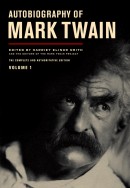 Twain famously asked that his autobiographical writings, mostly dictated in the final years of his life, be published 100 years after his death. His estate has partly defied that request, and publishers have bowdlerized the material over the years for various books. But this doorstop is the first of three planned volumes that will see the publication of the autobiography as Twain intended it. The first volume includes more previously published material than the next two will.
Twain famously asked that his autobiographical writings, mostly dictated in the final years of his life, be published 100 years after his death. His estate has partly defied that request, and publishers have bowdlerized the material over the years for various books. But this doorstop is the first of three planned volumes that will see the publication of the autobiography as Twain intended it. The first volume includes more previously published material than the next two will.
In the Guardian, Tim Adams gets a kick out of the fact that Twain asked for the century-long buffer: “Twain insisted on the 100-year embargo before publication in order to allow himself to speak freely, to tell all — though the idea that he had been tight-lipped in his opinions up to that point would have come as news to both friends and enemies.”
Edmund Morris, in the Wall Street Journal, doesn’t think autobiography is the right word:
Perhaps “repository” is a better word for what [Twain] proceeded to pile up over the course of six manic months in 1906 and left behind, still incomplete, at his death: an unorganized, crumbling, sneeze-provoking mass of letters, diaries, oral transcripts (more than 5,000 pages of them), news clips and other memorabilia. Now to be published in its entirety — this is the first of what will eventually be three volumes — Autobiography of Mark Twain aspires to completeness and definitiveness. Yet, as even the publisher admits, it is less a book than a gigantic fragment: the outpourings of [an] egotist so garrulous that the type sometimes dwindles to a size that will constrict your pupils.
But if that sounds like a warning more than a recommendation, Morris says that Twain goes on “a little too long” only once every 50 pages or so: “On the whole, however, this volume is hard to stop reading. Twain’s prosody is so sure, and his powers of observation and selection so great, that he can take the most unpromising material — a real-estate deed, a letter from a would-be author — and make it glitter…”
In the Los Angeles Times, Laura Skandera Trombley says, “Twain’s Autobiography offers a mélange of childhood reminisces, vitriolic diatribes, portraits of individuals admired and despised, eulogies (most movingly of his daughters Susy and Jean), political and religious exegesis and, everywhere, evidence of his astonishing, lightning-quick wit.” In conclusion, she strikes a brief imperative chord that sums up the many positive reviews of the book: “Pull up a chair and revel.”
But all is not positive. A second wave of reviews, in particular, seems almost uniformly skeptical and/or disappointed. Judith Shulevitz at Slate is perhaps the roughest of the work’s readers, saying we can deduce that “Twain simply hated writing his autobiography.” She calls the first installment of the project “a collection of parts . . . that together form a whole so ad hoc and disjointed that it is hard to credit the notion that Twain had a plan for the work that rises to the level of being worthy of punctilious reconstruction,” saying that only Twain scholars should bother with it.
John Eklund is glad the book is selling well, proving that “empty-headed zombie celebrities” don’t have to dominate the nonfiction bestseller list. He also champions it as the product of a university press: “If there is any remaining doubt about why this country desperately needs its university presses, with their commitment to big thinking, long-term publishing and scholarly excellence without regard to instant profitability, the University of California Press has proven it beyond a doubt. Every book lover owes them hearty thanks.”
Autobiography of Mark Twain, Vol. 1
University of California Press, 760 pp., $34.95

